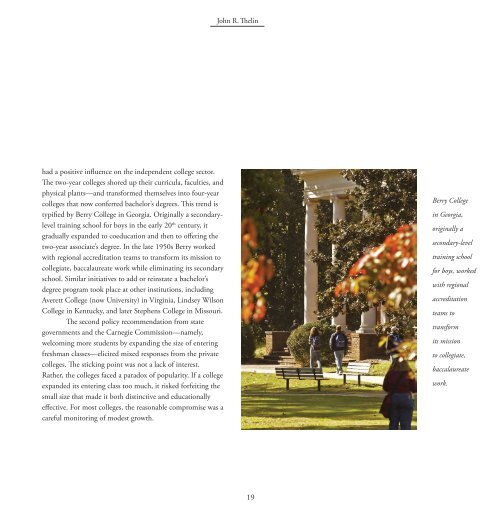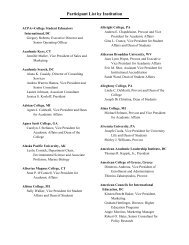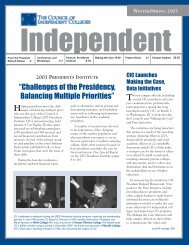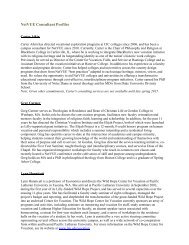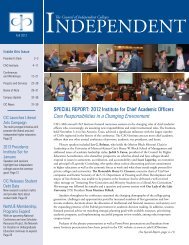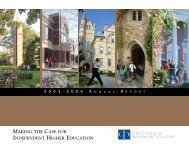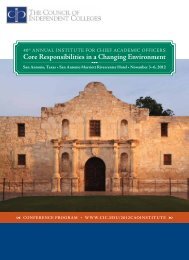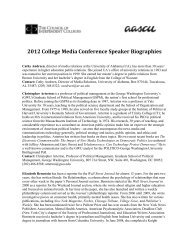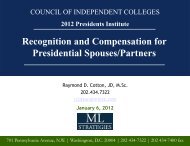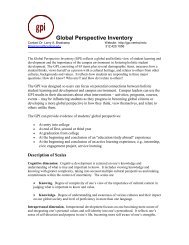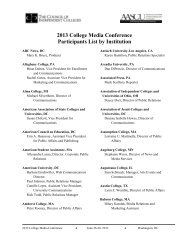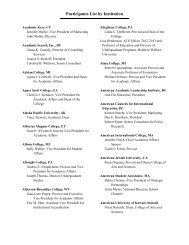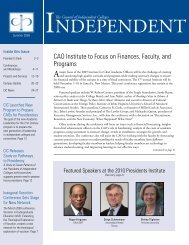Meeting the Challenge: - The Council of Independent Colleges
Meeting the Challenge: - The Council of Independent Colleges
Meeting the Challenge: - The Council of Independent Colleges
You also want an ePaper? Increase the reach of your titles
YUMPU automatically turns print PDFs into web optimized ePapers that Google loves.
John R. <strong>The</strong>lin<br />
had a positive influence on <strong>the</strong> independent college sector.<br />
<strong>The</strong> two-year colleges shored up <strong>the</strong>ir curricula, faculties, and<br />
physical plants—and transformed <strong>the</strong>mselves into four-year<br />
colleges that now conferred bachelor’s degrees. This trend is<br />
typified by Berry College in Georgia. Originally a secondarylevel<br />
training school for boys in <strong>the</strong> early 20 th century, it<br />
gradually expanded to coeducation and <strong>the</strong>n to <strong>of</strong>fering <strong>the</strong><br />
two-year associate’s degree. In <strong>the</strong> late 1950s Berry worked<br />
with regional accreditation teams to transform its mission to<br />
collegiate, baccalaureate work while eliminating its secondary<br />
school. Similar initiatives to add or reinstate a bachelor’s<br />
degree program took place at o<strong>the</strong>r institutions, including<br />
Averett College (now University) in Virginia, Lindsey Wilson<br />
College in Kentucky, and later Stephens College in Missouri.<br />
<strong>The</strong> second policy recommendation from state<br />
governments and <strong>the</strong> Carnegie Commission—namely,<br />
welcoming more students by expanding <strong>the</strong> size <strong>of</strong> entering<br />
freshman classes—elicited mixed responses from <strong>the</strong> private<br />
colleges. <strong>The</strong> sticking point was not a lack <strong>of</strong> interest.<br />
Ra<strong>the</strong>r, <strong>the</strong> colleges faced a paradox <strong>of</strong> popularity. If a college<br />
expanded its entering class too much, it risked forfeiting <strong>the</strong><br />
small size that made it both distinctive and educationally<br />
effective. For most colleges, <strong>the</strong> reasonable compromise was a<br />
careful monitoring <strong>of</strong> modest growth.<br />
Berry College<br />
in Georgia,<br />
originally a<br />
secondary-level<br />
training school<br />
for boys, worked<br />
with regional<br />
accreditation<br />
teams to<br />
transform<br />
its mission<br />
to collegiate,<br />
baccalaureate<br />
work.<br />
19


